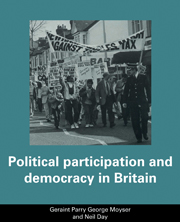Book contents
- Frontmatter
- Contents
- List of figures
- List of charts and maps
- List of tables
- Preface
- Part I Theories and methods
- 1 Participation and democracy
- 2 The study of participation and its political context
- Part II Patterns and pathways
- Part III Issues and actions
- Part IV The local process
- Part V Conclusions
- Appendix A Survey methods
- Appendix B Measuring elite-citizen concurrence
- Appendix C The National Questionnaire
- Endnotes
- Bibliography
- Index
1 - Participation and democracy
Published online by Cambridge University Press: 03 May 2011
- Frontmatter
- Contents
- List of figures
- List of charts and maps
- List of tables
- Preface
- Part I Theories and methods
- 1 Participation and democracy
- 2 The study of participation and its political context
- Part II Patterns and pathways
- Part III Issues and actions
- Part IV The local process
- Part V Conclusions
- Appendix A Survey methods
- Appendix B Measuring elite-citizen concurrence
- Appendix C The National Questionnaire
- Endnotes
- Bibliography
- Index
Summary
‘Government by the people’ is the fundamental definition of democracy, and one which implies participation by the people. Any book about political participation is also a book about democracy. Hence, the present work looks at how Britain is functioning as a democracy in the late twentieth century. It is based on the findings of a sample survey of nearly 1,600 people across England, Scotland and Wales and of a further 1,600 people and nearly 300 leaders in six specially selected and contrasting local communities. In the survey, people were asked about the extent to which they had taken action such as writing to their Member of Parliament, working in a group to raise a local problem, going on a protest march or canvassing for a political party. They were also asked about their experiences in taking action and the impressions they had formed of political institutions and processes.
The study is very much concerned with the more regular, day-to-day patterns of citizen political activity rather than confined to voting in general and local elections when interest in politics is artificially heightened by the activity of the parties and of what can be called the ‘political class’. Elections are, indeed, important moments in citizen political participation and their outcomes can change the contours of politics. As such, they have rightly been the subject of extensive investigation and they are included within the picture of participation to be presented here.
- Type
- Chapter
- Information
- Political Participation and Democracy in Britain , pp. 3 - 22Publisher: Cambridge University PressPrint publication year: 1992
- 3
- Cited by



